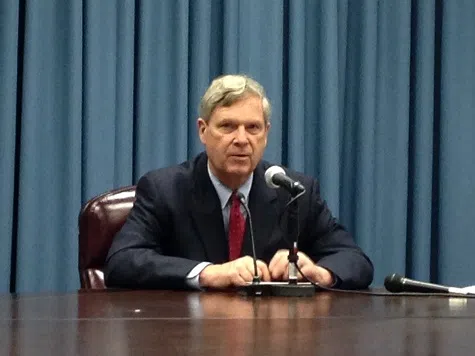By Carrie Muehling
WASHINGTON, D.C. – Agriculture groups continue to push for Trade Promotion Authority (TPA) to strengthen the chances for the TransPacific Partnership and other trade agreements.
Ambassador Darci Vetter, chief agriculture negotiator for the U.S. Trade Representative, told farm broadcasters in Washington, D.C. on Monday that TPA is essential when she sits across the table from foreign negotiators.
“TPA is incredibly important because it gives our Congress a role in the process, it gives our stakeholders a role in the process. It sets a very clear set of objectives that our trading partners can see so they know the bar they are going to have to meet before they get in there and negotiate with us. That’s a very important signal to them,” said Vetter. “But it also gives them the confidence that when we reach that agreement and I reach across the table and shake my negotiating partner’s hand, they know that’s the deal that will be voted on by Congress.”
USDA Secretary Tom Vilsack agrees that without TPA, these trade agreements won’t happen.
“It essentially, for all intensive purposes, makes it very difficult, if not impossible to get any trade agreements negotiated. And even if it gets negotiated, to have it submitted to a vote where 535 members of Congress can propose an amendment or two, which will likely change the deal significantly, which means we won’t have a deal,” said Vilsack.
Vilsack said countries the U.S. is currently dealing with will begin to exclude the U.S. from those talks if they can’t count on an “up or down” deal. He believes a country like China could step in and fill the void left by the U.S. when it comes to trading with other Asian countries. House Agriculture Committee Chair Mike Conaway (R-Texas) said even if TPA is enacted, there are options.
“The feature that’s probably the most convincing is the one that Paul Ryan has negotiated that allows us to turn it off, with respect to the House, on any individual trade deal. In other words, we set these parameters for how the President is supposed to deal with trade. If we don’t like that, if we think he or his negotiators are outside of those parameters, then we just simply have a majority vote in the House to turn it off,” said Conaway.
But the issue of TPA presents conflict for Sen. Debbie Stabenow (D-Michigan), who is the ranking member on the Senate Agriculture Committee.
“It is something that is very difficult for me. We’re a large exporting state, not just on agriculture but on automobiles and other manufactured products. My position has also been I want to export our products and not our jobs. It is different between closing a plant and moving it versus selling agriculture products that we grow here,” said Stabenow. “Until I see Trade Promotion Authority with objectives that require enforcement in them… I have to see much stronger language in terms of objectives in TPA in order to support it.”
Vilsack said the TransPacific Partnership could generate $123 billion of additional exports for the U.S. economy. The agriculture industry represents about nine percent of that. Trade was the overwhelming theme in Washington, D.C. this week, especially in light of a visit by Japanese Prime Minister Shinzo Abe.
Carrie Muehling can be reached at carrie@wjbc.com.





